Afro-Colombian Hip-Hop
Afro-Colombian Hip-Hop
Globalization, Transcultural Music, and Ethnic Identities
Christopher Dennis
LEXINGTON BOOKS
Lanham Boulder New York Toronto Plymouth, UK
Published by Lexington Books
A wholly owned subsidiary of The Rowman & Littlefield Publishing Group, Inc.
4501 Forbes Boulevard, Suite 200, Lanham, Maryland 20706
www.lexingtonbooks.com
Estover Road, Plymouth PL6 7PY, United Kingdom
Copyright 2012 by Lexington Books
All rights reserved. No part of this book may be reproduced in any form or by any electronic or mechanical means, including information storage and retrieval systems, without written permission from the publisher, except by a reviewer who may quote passages in a review.
British Library Cataloguing in Publication Information Available
Library of Congress Cataloging-in-Publication Data
Dennis, Christopher, 1974
Afro-Colombian hip-hop : globalization, transcultural music, and ethnic identities / Christopher Dennis.
p. cm.
Includes bibliographical references and index.
ISBN 978-0-7391-5056-6 (cloth : alk. paper) ISBN 978-0-7391-5058-0 (ebook)
1. Rap (Music)Social aspectsColombia. 2. Rap (Music)ColombiaHistory and criticism. 3. BlacksColombiaMusicHistory and criticism. 4. BlacksColombiaSocial conditions. 5. Hip-hopColombia. 6. Music and globalizationColombia. I. Title.
ML3917.C65D46 2012
782.42164909861dc23
2011037372

The paper used in this publication meets the minimum requirements of American National Standard for Information Sciences Permanence of Paper for Printed Library Materials, ANSI/NISO Z39.48-1992.
Printed in the United States of America
Contents
Acknowledgments
Afro-Colombian Historical Context
Demographics and Socio-Economic Indicators
Globalization and Neoliberal Reform
Why Afro-Colombian Hip-Hop and Rap?
Notes
| 2 | Hip-Hop Afrocolombiano: Origins, Production, and Distribution Practices |
Afro-Colombian Hip-Hop Groups
Production and Distribution
Notes
| 3 | Afro-Colombian Hip-Hop: Resistance and Political Protest |
Hip-Hop Real
The Armed Conflict
The Illicit Drug Trade
Displacement
The Urban Experience
Violence
Conclusions: The Periphery of the Periphery
Notes
| 4 | The Afro-Colombian Hip-Hop Narrative and Emerging Identity Constructs |
Mass-Mediated Transnational Cultural Contact
Racial Discrimination
Afro-Colombian Solidarity Movements and Cultural Organizations
Africa and the Diaspora
Conclusions: Pasado, Presente, Futuro
Notes
| 5 | The Afro-Colombianization of Hip-Hop |
Afro-Colombian Hip-Hop: From Adoption to Adaptation
Hip-Hop Real and Ethnic-Racial Tension
Mainstream Audiences and Growing Commercial Success
Conclusions: An Afro-Colombian Reading
Notes
| 6 | An (Afro)Colombian Hip-Hop Nation |
Mestizaje and Music Nationalism
Multiculturalism and Music Diversification
Ethnic Pride as an Expression of Colombian Nationhood
Conclusions: Colombias Hip-Hop Nation
Notes
| 7 | Conclusions: The Two Sides of Globalization |
The Next Chapter
Notes
Selected Discography
Bibliography
Index
Acknowledgments
This book is the result of years of research and writing carried out between 2002 and 2011 in both the United States and Colombia. My time spent abroad would not have been possible without the financial assistance provided by various institutions. I am very grateful to The Ohio State University where, as a graduate student, I received travel grants from the Office of International Affairs and the Center for Latin American Studies. I am also greatly indebted to the Fulbright Program, whose grant afforded me the opportunity to conduct extensive fieldwork and on-site research. Lastly, I would like to express my deepest appreciation to the University of North CarolinaWilmington for additional funding used to support travel, research, and scholarly presentations relevant to the books subject material.
This project was also made possible thanks to the cooperation and assistance from many individuals belonging to Colombias hip-hop and music communities. I want to extend a very special thank you to Yahany Tostao Valencia, Gloria Goyo Martnez, and Miguel Slow Martnez of Choc Quib Town, who graciously shared their homes and lives with me. Our countless discussions on music and racial relations in Colombia were vital to my work. Other performers and hip-hop participants who deserve special recognition for their collaboration and support include Flaco Flow & Melanina; Jhon J, Rico, and Shaoln of Zona Marginal; Almirante, Liri Gun, and Koala of Ghettos Clan; Smoka, Dr. Ganja, and the members of Asilo 38; Walter Indigo Hernndez of Systema Solar; Nene U of Ashanty; Proscopio Popn Rios of La Familia Ayara; Alexis Play; Midras Queen; Ras Binghi Nyah and Voodoo SouJahs; and last but not least, Diana Tobar Lozano.
I also want to express my appreciation to various acquaintances who were very supportive during my time conducting research in Colombia: professors Jaime Arocha, Francisco Ortega, and Mara Viveros, faculty members from the Centro de Estudios Sociales (CES) at the Universidad Nacional in Bogota; Juan de Dios Mosquera, director of Cimarrn; Fernando Urrea, professor of sociology at the Universidad del Valle in Cali; Alberto Angulo, author of Moros en la costa (1999); Giovonni Crdoba, one-time editor of the magazine Afro ; and the late Manuel Zapata Olivella, who twice took the time to discuss Colombian racial matters with me when I was a rather inexperienced but yet hungry graduate student.
For reading and commenting on my manuscript, I am extremely thankful to Jim Peltz and especially Michael Birenbaum, professor of music at Bowdoin College, who provided many thoughtful insights and suggestions. I owe many thanks to Dorothy E. Mosby, professor of Spanish at Mount Holyoke College, who introduced me to Afro-Hispanic studies and inspired me to pursue my scholarly interests in Afro-Colombian cultures. Also, I would like to offer my sincere gratitude to my former advisor, Abril Trigo, distinguished professor of Latin American cultures at The Ohio State University, who guided and assisted me from the initial stages of my research to the completion of my dissertation. As friends and colleagues, both Dorothy and Abril have encouraged me to see this book project through to the end.
I also wish to extend my appreciation to Lenore Lautigar, associate editor at Lexington Books, for supporting my efforts to convert my manuscript into book form.
Finally, to my friends, colleagues, and family, whose love, patience, and encouragement carried me through this long process, I am profoundly grateful.
Chapter One
Introduction
When I began my research in the summer of 2002, I was exploring Afro-Colombian literature and hoping to find an up-and-coming generation of fiction writers addressing present-day issues relevant to the countrys black communities. Unfortunately, within a landscape of growing poverty, violence, civil war, and political struggle, there is often little time or space for culture. Many, if not most, Afro-Colombians are consumed by their daily struggles for survival. Nonetheless, my research took a somewhat unexpected turn one morning in Bogota while sitting in Cimarrn (an Afro-Colombian social and political organization) prior to a meeting with cofounder Juan de Dios Mosquera. The office is always adorned with an array of afro-centric decorations, iconography, and art, but what caught my attention that particular morning was a poster of several young Afro-Colombian rappers from a group called Ghettos Clan. As someone who grew up in the 1980s during hip-hops explosion into mainstream U.S. culture, I was immediately intrigued. I set out to learn more about the Colombian hip-hop scene, and I eventually met rapper Yahany Tostao Valencia, at that time part of the duo Mensajeros and now a member of one of Colombias most renowned hip-hop groups, Choc Quib Town (sometimes spelled ChocQuibTown). Just a few minutes into our conversation and I could see that Tostao was an intelligent and charismatic young man. We spent the greater part of the day talking about music, the national hip-hop scene, and racial relations in Colombia. He sold me several CDs of local hip-hop artists, and from that day on, I was hooked.

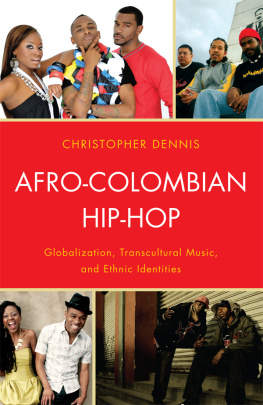

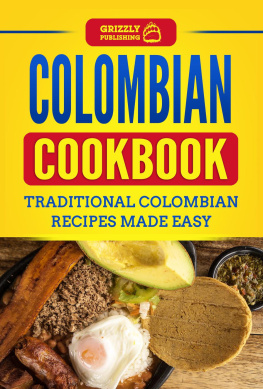
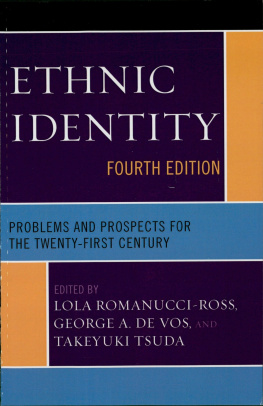
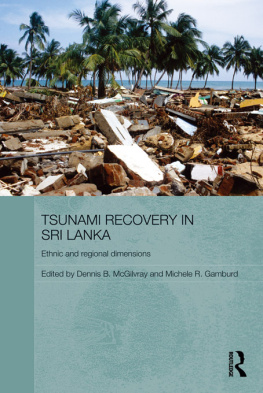
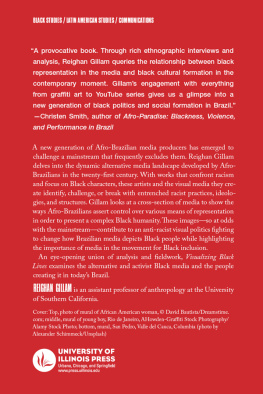
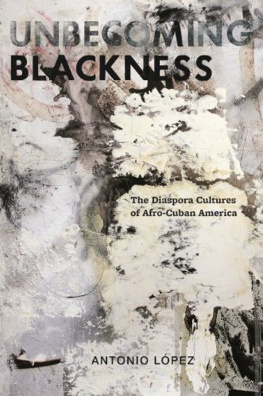
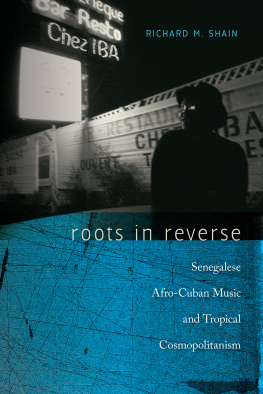
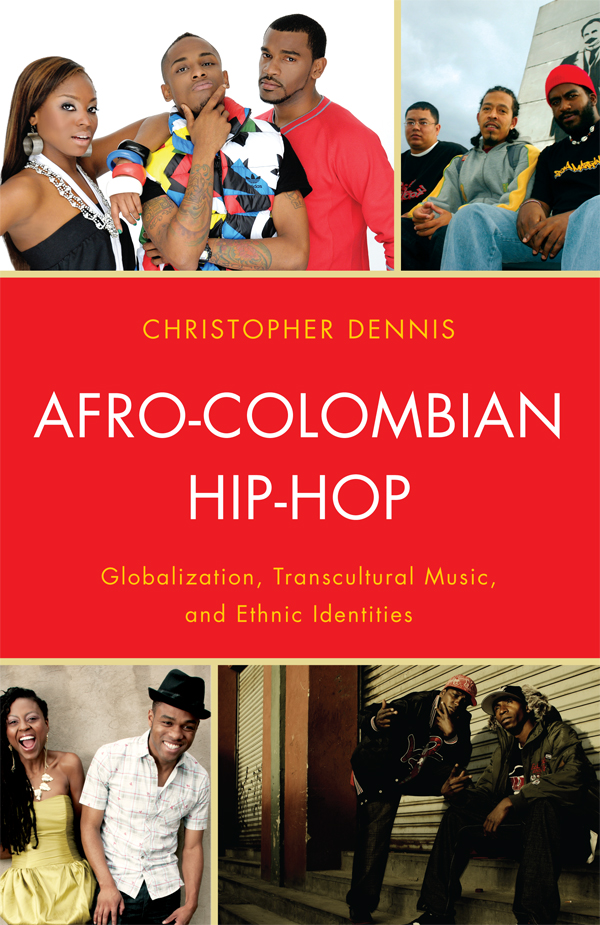
 The paper used in this publication meets the minimum requirements of American National Standard for Information Sciences Permanence of Paper for Printed Library Materials, ANSI/NISO Z39.48-1992.
The paper used in this publication meets the minimum requirements of American National Standard for Information Sciences Permanence of Paper for Printed Library Materials, ANSI/NISO Z39.48-1992.